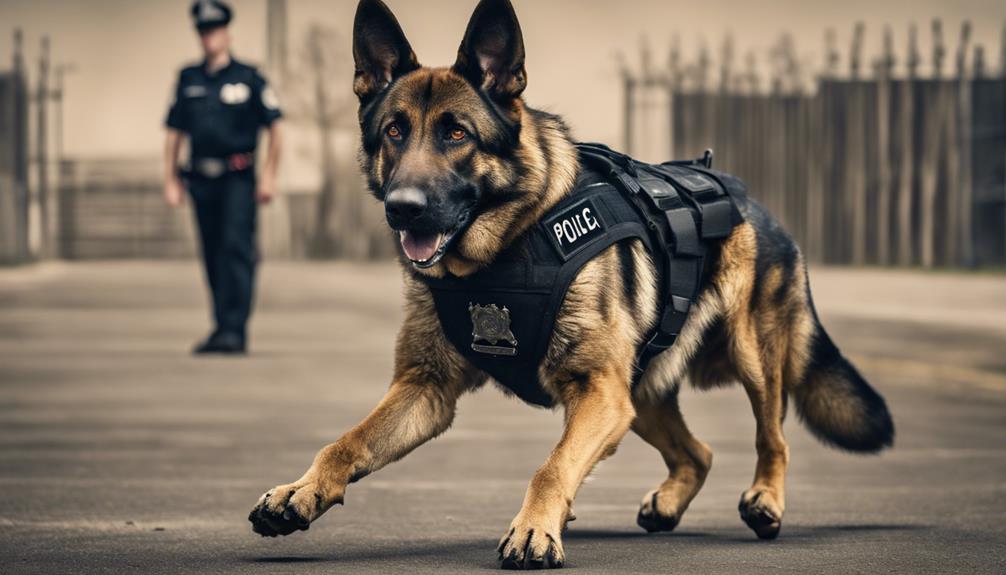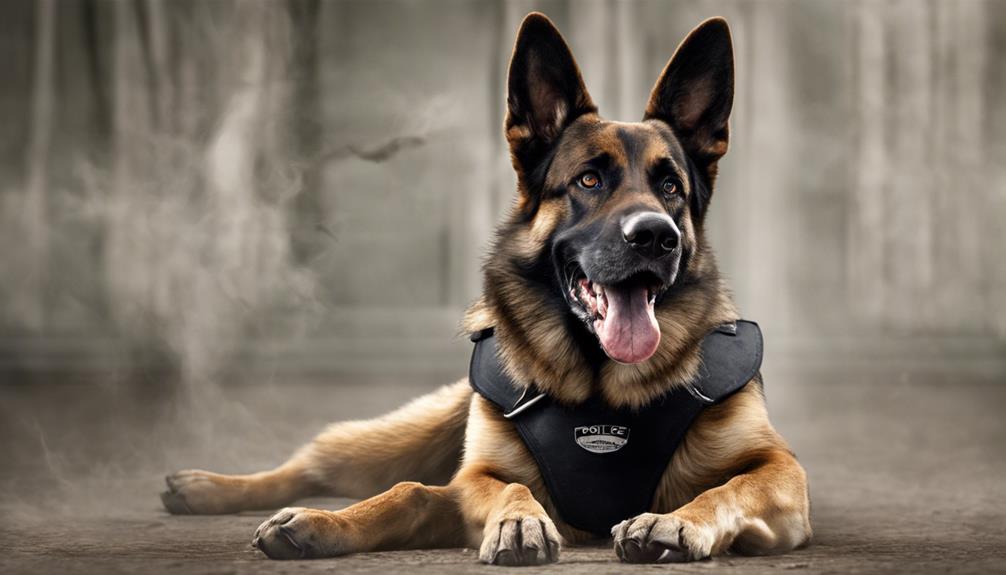In order to excel in careers involving police dog training, it is essential to master key skills such as responsibility, stress management, assertiveness, confidence, knowledge, and discipline. Dealing with the significant level of responsibility and influencing the behavior of intelligent animals demands exceptional stress management abilities to remain composed and composed. Assertiveness and confidence play a vital role, as demonstrating leadership and control helps establish boundaries and earn trust. Acquiring proficiency in obedience training, scent detection, and breed-specific techniques while upholding discipline and diligence in training is essential for achieving optimal results. Embracing continuous self-improvement and effective communication, as well as fostering trust and reliability with the dogs, are crucial elements. These skills form the basis for success in training police dogs, paving the way for productive law enforcement partnerships.
Key Takeaways
- Impeccable stress management skills required for handling high levels of responsibility.
- Assertiveness and confidence are essential for establishing leadership and control.
- Acquire expertise in obedience training, scent detection, and breed-specific methods.
- Maintain discipline and diligence to achieve optimal training results.
- Continuous commitment to self-improvement through learning and professional development.
Responsibilities and Stress Management
To effectively handle the high levels of responsibility and stress inherent in police dog training jobs, trainers must maintain composure and focus to guarantee the readiness of their canine partners. As a police dog trainer, you bear the weight of shaping the behavior of these intelligent animals for important law enforcement tasks. This responsibility demands impeccable stress management skills to navigate the pressure of training sessions and real-world deployments.
Your role involves more than just teaching commands; it encompasses molding the instincts and reactions of police dogs to make sure they perform effectively in high-stress situations. This requires you to stay calm and collected even when faced with challenging behaviors or demanding training scenarios. By mastering stress management techniques, such as deep breathing or visualization exercises, you can remain in control and guide your canine companions towards success.
Assertiveness and Confidence

To effectively train police dogs, it's important to project confidence and assertiveness. Your leadership and control are essential for guiding the dog through training tasks.
Decisiveness in your actions will help establish trust and respect with the K-9 unit.
Leadership and Control
Developing strong leadership and control skills, especially in relation to assertiveness and confidence, plays an essential role in effectively managing police dog training processes.
As a police dog trainer, your ability to lead with confidence and assertiveness sets the tone for successful training sessions. Leadership skills are necessary for directing both the dog and the training process effectively. Being assertive helps establish boundaries and commands that the dog must follow in a disciplined manner.
Confidence is key to gaining the trust and respect of the dog, ensuring prompt responses to commands. Control over the training environment and the dog's behavior is required for achieving desired outcomes.
Decisiveness in Actions
Showing decisiveness in your actions is a fundamental trait for a police dog trainer, reflecting both assertiveness and confidence in handling and guiding the dogs effectively. Being decisive means making quick and effective decisions during training sessions, ensuring safety and success.
Your assertiveness establishes authority and leadership, leading to better obedience and performance from the dogs. Confidence in your actions fosters trust and respect, improving the training process and overall results.
Demonstrating decisiveness not only shows your competence but also highlights your professionalism in managing and guiding police dogs. Remember, decisiveness, assertiveness, and confidence are key components in achieving obedience and excellence in your role as a police dog trainer.
Knowledge and Expertise
To excel in police dog training, you must acquire knowledge and expertise in a variety of areas. Understanding different skill development techniques and breed-specific training methods is essential for success.
It's vital to continuously learn and keep updated on the latest training techniques and trends in the field of police dog training.
Skill Development Techniques
Mastering specialized knowledge in dog behavior and training techniques is essential for success in police dog training jobs. As a police dog handler, understanding canine behavior and learning is pivotal. Utilizing behavior modification and operant conditioning principles, professional K-9 handlers shape desired behaviors effectively. To enhance your skills, consider the following techniques:
| Skill Development Techniques | Description | Benefits |
|---|---|---|
| Obedience Training | Teaches dogs commands and proper behavior | Enhances control and cooperation |
| Scent Detection | Trains dogs to detect specific scents | Essential for search and rescue missions |
| Apprehension Techniques | Instructs dogs to subdue suspects | Critical for law enforcement tasks |
Mastery in these areas equips you to train police dogs proficiently and guarantees their readiness for duty.
Breed-specific Training Methods
Developing expertise in breed-specific training methods is vital for police dog trainers to effectively prepare different dog breeds for specialized law enforcement tasks. Understanding breed characteristics, behaviors, and abilities is essential for tailoring training techniques to maximize potential.
Trainers must adapt methods based on each breed's strengths, weaknesses, and instincts to guarantee success in police work. Specialized knowledge in breed-specific training helps address challenges unique to each breed, optimizing performance in law enforcement tasks.
Expertise in breed-specific training methods allows trainers to customize programs to meet individual breed needs effectively. By honing breed-specific training skills, trainers can enhance the capabilities of police dogs and make certain they're well-prepared for the demands of their specialized roles.
Discipline and Diligence

How important is discipline and diligence in police dog training jobs? Professional police dog trainers rely heavily on these qualities to excel in their roles. Here are some key points to ponder:
- Training Methods: Using disciplined training methods is pivotal for effectively teaching dogs to perform their duties.
- High Training Standards: Diligence is essential for maintaining the high standards required in police dog training programs.
- Monitoring Behaviors: Diligently observing and analyzing the dogs' behaviors helps trainers address any issues promptly.
- Optimal Results: Discipline in following training protocols and schedules is necessary for achieving success in police dog training.
Commitment to Self-Improvement

Continuously enhancing your knowledge and skills is essential for excelling in the dynamic field of police dog training. As a professional dog trainer, staying updated on the latest training techniques is vital for being highly skilled in handling and training police dogs effectively. Seeking mentorship from experienced trainers and attending workshops, seminars, and conferences are excellent ways to improve your abilities. By engaging in ongoing professional development opportunities, you can maintain a high level of proficiency and adaptability in this field. Demonstrating a strong commitment to self-improvement not only showcases your dedication to excellence but also guarantees the success of the police dogs in law enforcement tasks.
| Key Points | Description | Importance |
|---|---|---|
| Continuous Learning | Stay updated on training techniques | Highly Skilled |
| Seeking Mentorship | Learn from experienced trainers | Effective Training |
| Professional Development | Maintain proficiency and adaptability | Bureau of Labor |
Communication and Discipline in Training

To effectively train police dogs, mastering clear communication and consistent discipline is essential. When working with these professional animals, your ability to convey commands effectively and maintain a structured training environment is key to success. Here are some important points to keep in mind:
- Effective Communication: Clear and concise communication is vital in ensuring that your police dog understands what's expected of them during training sessions.
- Consistent Discipline: By enforcing consistent discipline, you reinforce desired behaviors and correct any unwanted actions, leading to a well-trained and reliable police dog.
- Establishing Trust: Building a strong bond through communication and discipline helps establish trust and respect between you as the trainer and the police dog, fostering a successful training partnership.
- Reliable Performance: Discipline in training sets clear boundaries and expectations for police dogs, ultimately resulting in reliable performance in real-life situations.
Frequently Asked Questions
What Skills Do Police Dogs Need?
To excel in police work, your dog must master strong obedience, respond swiftly to verbal and hand signals, detect substances like drugs and bombs accurately, work collaboratively with you, apprehend suspects, and find missing persons reliably.
What Skill Do You Think a Professional Dog Trainer Needs to Have?
You must possess impeccable communication, patience, understanding of behavior, problem-solving, and adaptability to excel as a professional dog trainer. Your skills will shape you into a masterful trainer capable of transforming any canine.
What Makes a Good Police K9 Handler?
To be a good police K9 handler, you must build trust and teamwork with your dog, understand canine behavior, communicate clearly, and possess patience, assertiveness, and consistency. Experience in law enforcement or as a K9 handler is often required.
What Skills Are Needed for Dog Handling?
To excel in dog handling, you require a deep understanding of canine behavior, clear communication skills, patience, adaptability in training methods, and keen observation. These essential skills will help you foster trust and obedience in dogs effectively.
What Are the Essential Skills Needed for Landing Police Dog Training Jobs?
For aspiring K9 handlers, specific skills are vital for securing dog training job opportunities. Strong communication, problem-solving, and leadership abilities are essential. Additionally, a keen understanding of dog behavior, obedience training, and animal care are critical requirements for landing police dog training jobs.
Conclusion
To sum up, it's crucial for police dog trainers to possess a variety of skills to succeed in their jobs.
One intriguing statistic is that police dog trainers can earn an average salary of $56,000 per year, according to the Bureau of Labor Statistics.
By mastering responsibilities, assertiveness, knowledge, discipline, commitment, communication, and training techniques, you can excel in this challenging but rewarding career.
Keep practicing and honing your skills to become an excellent police dog trainer.









